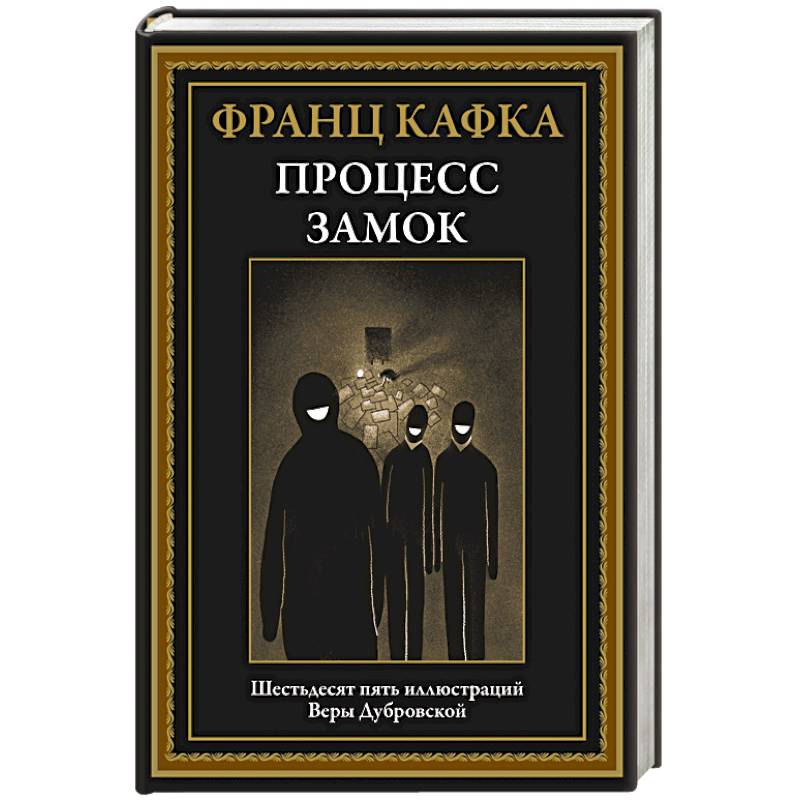Process. Lock
Please sign in so that we can notify you about a reply
The collection includes two works by the Austrian writer Franz Kafka (1883-1924) - the novels "The Trial" (1914-1915) and "The Castle" (1922), which have become a peculiar symbol of the author's creativity, some of the most mysterious texts of the 20th century. The novels were translated into Russian by Rita Yakovlevna Wright-Kovaleva (1898-1988), and their design features 65 drawings by the contemporary artist Vera Dubrovskaya.
"All of Kafka's works are highly reminiscent of parables, they contain a lot of moral lessons, but his best works are like crystalline hardness, permeated with vividly playing light, achieved sometimes by very pure, often cold and precisely balanced language." - Hermann Hesse
The artistic legacy of Franz Kafka (1883-1924) is relatively small - three unfinished novels ("America", "The Trial", and "The Castle"), four collections of short stories, and several other short works, with the majority of these works being published posthumously and against the author's last will. Nevertheless, Kafka is rightfully considered not only one of the greatest German-language writers but also one of the key figures in 20th-century literature. His works, simultaneously simple and incredibly complex, combining elements of realism and fantasy, permeated with absurdity and fear of external forces, engaging the reader in an incredible metaphorical and enigmatic world, evoking feelings of confusion, anxiety, and disorientation, are unique, incomparable, and resist unambiguous interpretation. Each reader must give their own definition to the adjective "Kafkaesque" and not expect it to coincide with the definition of other literature enthusiasts.
- Kafka suffered from tuberculosis and was aware of his imminent death. He bequeathed to his close ones to destroy the drafts of his works, but his friends Max Brod and Milena Jesenská violated his last will.
- Kafka did not drink or smoke, regularly rode a bicycle and swam, did not consume coffee, and at the age of 28 became a vegetarian, although his grandfather was a butcher.
- Until the age of 31, Kafka lived with his parents, and his relationship with his father, whom the writer accused of despotism and even cruelty, was extremely complex.
- Kafka was never married, but was engaged several times, including twice to Felice Bauer, and both times he broke off the engagement himself.
- Kafka received a legal education, worked at the Prague "Workers' Accident Insurance Institute," and considered his work burdensome and useless, yet it was he who first proposed and implemented the use of a hard hat for workers in industrial enterprises in Czechoslovakia, for which he was awarded a state medal.
- Kafka is referred to as Czech, Austrian, Jewish, and German writer; he was born in Austria-Hungary, lived in Prague, and wrote his works in the German language.
- Kafka's favorite writers, with whom he "did not claim to match in strength and intellect," were Dostoevsky, Flaubert, Grillparzer, Kleist, and Gogol.
Author:
Author:Kafka F.
Cover:
Cover:hardcover
Category:
- Category:Fiction
- Category:Modern Literature
Publication language:
Publication Language:Russian
Paper:
Paper:offset
Dimensions:
Dimensions:24x17x2.3 cm
Age restrictions:
Age restrictions:16+
Product type:
Product type:gift edition, gold embossing
ISBN:
ISBN:978-5-9603-0798-7
No reviews found
